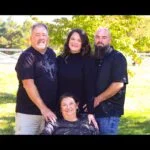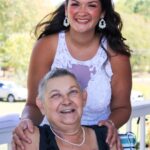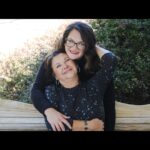My mom, Tammy, was first diagnosed with stage 2B ER+ breast cancer in 2003, at the young age of 40. She had been experiencing breast issues and, trusting her instincts, advocated for herself to get a diagnostic mammogram and biopsy. Even though she was young, she knew something wasn’t right and refused to be dismissed without answers. When the biopsy came back positive, further scans revealed the aggressive nature of the cancer. It had already spread to both breasts and a few lymph nodes.
That year, she endured a total mastectomy, a hysterectomy, 12 rounds of chemotherapy, and reconstruction surgery—14 surgeries in total within a single year. Yet, through it all, she never once complained. She would always remind us, “We have to stay positive. I’m cowgirl tough!” Her surgeon later told her that, had she not advocated for herself, she would have had only six months to live. But my mom had so much to live for. I had just turned 10, my parents had just become foster parents to four more children, and she had a horse farm she was determined to return to. Nothing, not even cancer, could keep her away from the horses and barn she loved.
Fast forward 19 years to 2022. My mom began experiencing pain in her hips and chest but repeated doctor visits led to diagnoses of costochondritis or a pulled muscle. Despite the reassurances, my mom felt something was wrong. Then, a lump appeared near her neck.
After requesting a biopsy, the results came back as cancerous. At first, they thought it might be lymphoma, but her persistent bone pain was alarming. A bone scan revealed the devastating truth: the cancer had spread to her bones, from her skull to her hips and everything in between. That explained the unbearable pain she had endured for months.
We got the news just as we finalized plans for my dream destination wedding in Jamaica. Mom and I threw ourselves into wedding planning, using it as a distraction from the diagnosis. When she met with her oncologist, the news got even worse. If it was triple-negative breast cancer, she likely had about a year left and would be on chemotherapy for the rest of her life. Through tears, I told her, “We’ll live out your bucket list this year, Momma.” Her response still echoes in my heart: “I’ve been living it for the last 19 years, baby.”
But my mom wasn’t ready to surrender to that diagnosis. She sought a second opinion, got a new oncologist, and was referred to MD Anderson in Houston. We clung to hope when her treatment team offered more optimism, though they confirmed the cancer was indeed triple-negative. Mom started chemo again and braced herself for the fight of her life. One of her treatments, Trodelvy, worked wonders. A bone scan in May 2023 showed remarkable improvement—most of the cancer in her bones was gone. We were overjoyed, hopeful that she would defy the odds yet again.
But a few weeks later, everything changed. The chemo had taken a toll on her kidneys, leading to sepsis. She switched to immunotherapy, but it didn’t stop the cancer from spreading rapidly. In September 2023, the cancer spread to her brain. My mom, ever strong, tried to hide her symptoms, but we could tell it was serious. Within weeks, she was placed in hospice care.
Despite everything, we found a moment of beauty. My mom, always thinking of others, helped me plan a vow ceremony so she could see me in my wedding dress and hear the vows my partner and I had written. On October 2, 2023—just five days before our destination wedding—my mom passed away. She fought with everything she had, never once complaining, consistently strong.
I was just a child when my mom was first diagnosed, but I grew up watching her advocate for her health and encourage others to do the same. She spoke passionately about the importance of annual screenings, telling everyone, “If you feel a lump, get it checked out. That’s what saved my life.” She was a beacon of support for newly diagnosed women, offering a listening ear and sharing her experiences.
Today, as the Director of Population Health and Quality Improvement at Family Health Centers (FHC), my team and I are responsible for scheduling patient preventative care screenings. After losing my mother, I am more motivated than ever to help as many women as possible access these life-saving screenings. I advocate for regular self-exams, timely mammograms, and, most importantly, being your advocate when something doesn’t feel right. Early detection saves lives. My mom’s story is a testament to that.
I’m proud to work at FHC, where we ensure that healthcare is accessible to all. For women without insurance, we offer screenings through our Mammogram Van, which visits each site monthly. Financial concerns shouldn’t stop anyone from getting the care they need—resources are available to help cover the costs. At FHC, we guide women through the process, from getting established as patients to connecting them with the Kentucky Women’s Cancer Screening Program and other resources. If anyone needs help, I urge them to contact the Population Health line at 502-772-8351.
In June, to honor my mom’s birthday, I hosted a breast cancer awareness event at our Portland office. We partnered with the Kentucky Women’s Cancer Screening Program to provide educational materials, schedule mammograms, and pass out pink cupcakes. The success of that event inspired me to make our October Breast Cancer Awareness events bigger than ever. We’re holding bake sales, weekly raffle fundraisers, and selling T-shirts this year. We’re also participating as a team in the Making Strides Against Breast Cancer Walk, with every dollar raised to the American Cancer Society. Each dollar brings us one step closer to finding a cure for the disease that took my mom away from us.
I will continue to advocate for women’s health and honor my mother’s legacy through the work FHC encourages and supports. She fought for her life, and I will fight to ensure that no other mother or daughter must endure what we did.
Brittany Smith Receveur






